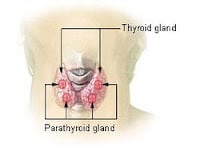A sizable study reveals good news about the possible connection between hypothyroidism and dementia.
CHICAGO — In a study concluding with good news, hypothyroidism was not associated with mild cognitive impairment (MCI), which is sometimes referred to as “pre-Alzheimer’s” or “pre-dementia.”
The study of older patients was published by JAMA Neurology, a JAMA Network publication.
Some evidence has suggested that changes in the endocrine system, including thyroid function, may be linked to the development of Alzheimer disease and other dementias, according to the study background.
MCI is thought to be a precursor of Alzheimer disease. By performing the study on MCI, the results were, in many ways, more conclusive than they would have been had the study been performed on patients with Alzheimer’s or another form of dementia.
Ajay K. Parsaik, M.D., of the University of Texas Medical School, Houston, and colleagues sought to determine if there was an association between subclinical (mild) and clinical hypothyroidism and MCI in a group of older study participants (who were between the ages of 70 and 89 years) in a Minnesota county.
Of the 1,904 eligible participants, MCI occurred in 16 percent of 1,450 participants with normal thyroid function, in 17 percent of 313 patients with clinical hypothyroidism, and in 18 percent of 141 participants with subclinical hypothyroidism, according to the study results. Researchers found no association between clinical or subclinical hypothyroidism and MCI after they considered factors such as age, sex, body mass index and a variety of other diseases in the study participants.
“Our findings need to be validated in separate settings using the standard criteria for MCI and validated in a longitudinal study. This study contributes to the growing body of evidence that suggests that hypothyroidism is not associated with MCI,” the authors conclude.
MORE INFORMATION:
- JAMA Neurology. doi:10.1001/.jamaneurol.2013.5402.
Editor’s Note: Funding and conflict of interest disclosures are available. Go to http://media.jamanetwork.com for additional information, including other authors, author contributions and affiliations, financial disclosures, funding and support, etc.












First of all the connection between AD and thyroid is its involvment in the hypo och hyper metabolism feat, that means its totaly separate from hypothyroidism, so the study is basicly useless, if you however would compare tau hyper-fosforylation against hyper-thyroidism you will find shared patterns, but researchers are unable to connect the dots like me
Why is it good news. I have hypothyroidism and both parents have different types of dementia.. I'm worried now
I'm glad because I have hypothyroidism and my mom had dementia.
I too was born with hypothyroidism and my mum has just passed away from dementia. It was and has been my worst fear. Now I can relax a little and think positive thoughts.
Yes! I llike that!
Finally some good news.